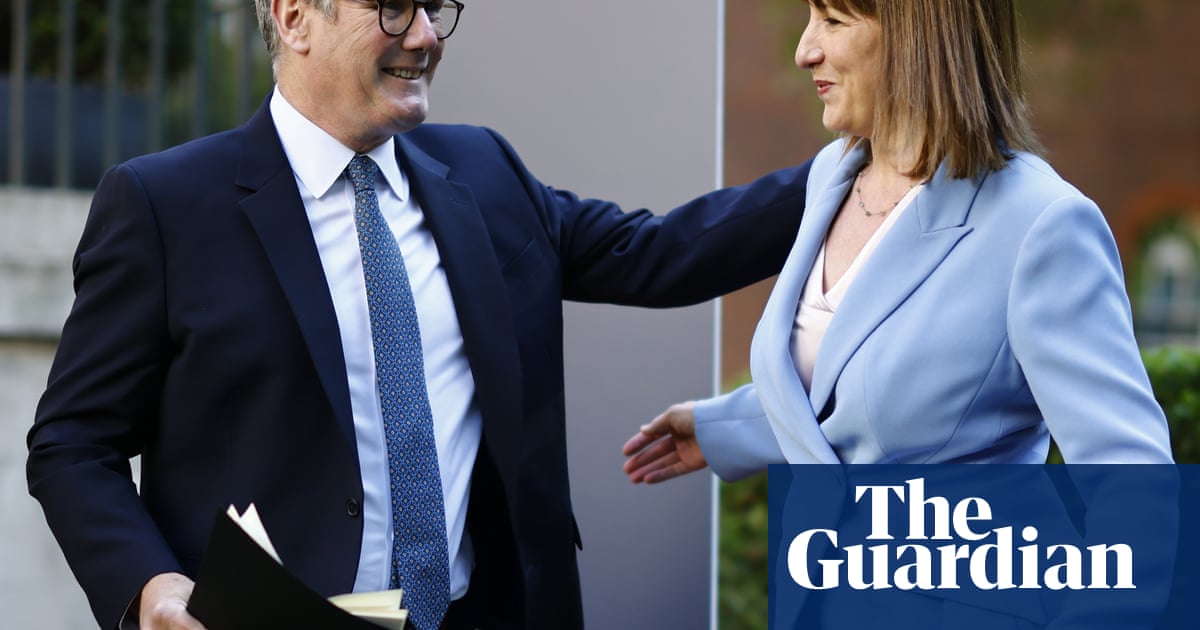UK government bond markets have rallied after Keir Starmer backedRachel Reevesto remain as chancellor for “a very long time” despite lingering investor concerns over a multibillion-pound hole in Britain’s public finances.
The yield – in effect the interest rate – on British government bonds, also known as gilts, fell by about 0.1 percentage points on Thursday morning to trade close to 4.5%, reversinga sharp rise on Wednesdaysparked by feverish speculation over Reeves’s future.
The pound rose against other leading currencies, while a closely watched business survey showed that Britain’s dominant service sector recorded its fastest rate of growth in 10 months.
After Starmer had failed initially to give his full backing to a tearful Reeves at prime minister’s questions, he used a BBC interview late on Wednesday to publicly express his support for the chancellor and denied suggestions she was upset by the fallout over the government’s welfare bill.
However, investors warnedthat a climbdown over the billand the backtracking on cuts to winter fuel payments for most pensioners had left a large hole in the public finances that would need addressing at the autumn budget.
After Thursday morning’s recovery in the bond markets, Neil Wilson, the UK investor strategist at Saxo Bank, said: “The calculation was that [Reeves is] probably the most market-friendly chancellor Labour could field, so replacing her indicated a higher chance of changing fiscal rules, implying more debt and instability.
“But there is a deeper problem for the government here even if she stays – the market is getting nervous about its ability to make the sums add up whether she is ‘market-friendly’ or not, and the economic outlook is hardly improving.”
Abroad rebellion by Labour backbench MPsforced ministers to withdraw a planned £5.5bn cut to disability benefits this week, on top of earlier concessions on winter fuel payments worth £1.25bn.
Reeves has repeatedly promised to stick to her “iron-clad”fiscal rules, which require day-to-day spending to be matched by receipts within five years. This is despite mounting spending pressures and rising debt interest costs.
Having committed not to make further large tax increases after last autumn’s budget, the chancellor turned to welfare savings in herspring statementto rebuild the £9.9bn of headroom against the government’s main fiscal target after a deterioration in the outlook for the government finances.
Economists said Reeves could break her fiscal rules unless corrective action was taken in the autumn budget. Meanwhile there is speculation that the financial hit from Labour’s U-turns could be further complicated by a cut to the growth forecasts of the Office for Budget Responsibility, the Treasury watchdog.
Sign up toBusiness Today
Get set for the working day – we'll point you to all the business news and analysis you need every morning
after newsletter promotion
But in a potential boost for the chancellor, the latest snapshot from the S&P Global UK Services PMI, a closely watched business survey, showed a sharp rise in private sector activity buoyed by improving business and consumer spending.
Yet concerns remain over the impact from lingering inflationary pressures, Labour’s tax increases introduced in April and the end of Donald Trump’s 90-day pause in his US tariff plans on 9 July.
Economists said tax increases would probably be required given the challenges Labour has faced in cutting spending, and warned that ditching the fiscal rules to allow more borrowing could provoke a sharp reaction in bond markets.
Jim Reid, the head of macro and thematic research at Deutsche Bank, said: “For markets, the logic is that Reeves has been a big defender of the fiscal rules, and there have been growing calls for these rules to be eased and for borrowing to go up. So the concern in bond markets is that a new chancellor might trigger a fresh wave of borrowing that pushes rates up further.
“Unless we got a big burst of growth before the budget, then the government would need to announce further tax rises or spending cuts if they still want to meet the fiscal rules. So this leaves them in a tricky position.”
